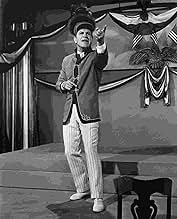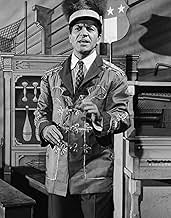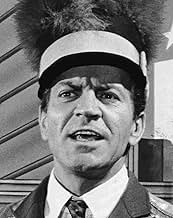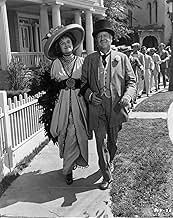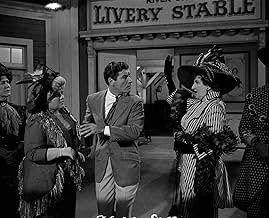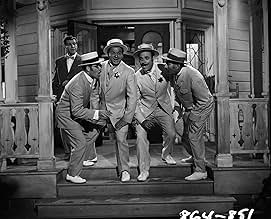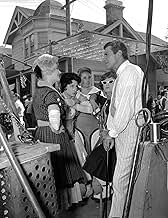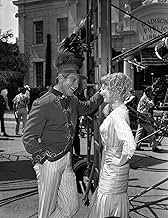Ajouter une intrigue dans votre langueTraveling con artist Harold Hill targets the naïve residents of a small town in 1910s Iowa by posing as a boys' band leader to raise money before he can skip town.Traveling con artist Harold Hill targets the naïve residents of a small town in 1910s Iowa by posing as a boys' band leader to raise money before he can skip town.Traveling con artist Harold Hill targets the naïve residents of a small town in 1910s Iowa by posing as a boys' band leader to raise money before he can skip town.
- Réalisation
- Scénario
- Casting principal
- Récompensé par 1 Oscar
- 6 victoires et 12 nominations au total
- Jacey Squires
- (as The Buffalo Bills)
- Winthrop Paroo
- (as Ronny Howard)
- Ewart Dunlop
- (as The Buffalo Bills)
- Olin Britt
- (as The Buffalo Bills)
- Oliver Hix
- (as The Buffalo Bills)
Avis à la une
When he jumps train in River City to escape the wrath of an angry gathering of his peers, whom he has `Given a black eye' to in the territory, thanks to his dubious business practices, he sets about plying his trade on the good folks of middle America. But right out of the chute, he runs into some problems: The Mayor of River City, George Shinn (Paul Ford) wants his credentials, the lovely young local piano teacher and librarian, Marion (Shirley Jones), has her doubts about him, and he lacks an `angle,' something to convince the local citizenry of the need for a `boys band' to get them out of the trouble they're in-- even if there isn't any until he `creates' it.
One of his problems is solved when he runs into Marcellus Washburn (Buddy Hackett), a former shill of his, who mentions the new billiard table that just arrived in town. And that's all the Professor needs; because now they've got trouble, `With a capital T' that rhymes with P' and that stands for Pool'!' With that, he's up and running and he's got everything timed, right down to the `Last wave of the conductor's hand on the last train out of town.' Yee-gods and great honk! River City, Iowa, is about to have their very own boy's band.
Robert Preston gives the most memorable performance of his career as Hill, the silver-tongued salesman who can palaver past postulated proffered predicaments quicker'n an eggheaded egret's emblematized egression. It's just a matter of charm, style and timing, and Preston imbues Hill with em all, and more. He brings a mesmerizing presence to the screen in this role that is absolutely perfect; Preston IS Harold Hill, and he makes him his own in such a way that it's impossible to visualize anyone else in the role. It certainly gave Preston a chance to demonstrate his amazing versatility, and he really made the most of it, carving out a niche for himself in cinematic history.
The beautiful and talented Shirley Jones is terrific, as well, as `Marion the Librarian,' the young woman with a heart of gold who becomes a formidable opponent for Hill as he tries to charm his way past her suspicions of him. Jones personifies everything that is pure, moral and good, without being prudish, and it makes Marion a truly endearing character. And, like Preston, her performance is so good it's impossible to picture anyone else in the part. She's simply magnificent.
The made-to-order supporting cast includes a very young Ron Howard, unforgettable as Winthrop Paroo, Marion's little brother, Hermione Gingold (Eulalie Mackechnie Shinn), Pert Kelton (Mrs. Paroo), Monique Vermont (Amaryllis), Susan Luckey (Zaneeta), Timmy Everett (Tommy Djilas), Harry Hickox (Charlie) and Mary Wickes (Mrs. Squires). Featuring a number of memorable songs, including `76 Trombones,' `Till There Was You,' `Gary, Indiana' and of course the catchy `Trouble In River City' number, `The Music Man' is an uplifting, totally transporting film that makes the world seem like a pretty good place after all. This is the `Good Old Days' the way we'd like to think they really were, and it's all courtesy of the magic of the movies. I rate this one 10/10.
This movie has it all - wonderful music, a fine script, good production values and a top cast. What makes it really special is Robert Preston's tour-de-force performance. His performance is, quite simply, one of the most memorably great performances in the history of film.
It's one of those benchmark performances that must make any other actor who takes the role shake in their boots, for as long as the memory of Robert Preston as Prof. Hill exists all others will be compared against him and, likely, found lacking.
The rest of the cast is superior. I especially love Pert Kelton as Marian the Librarian's mother. Kelton was the original Alice on the classic "The Honeymooners" (she played Alice's mother later on in the series) and she had incredible comic timing. She reminds me of a combination of Ethel Merman, with her brassy voice and larger-than-life presence, and the comic genius of the great Patsy Kelly. It's a shame Kelton was not put to better use in the movies. She was a natural.
And then there is Shirley Jones. Lovely to look at and wonderful to hear and a good enough actor to keep up with Preston.
Buddy Hackett usually annoyed me but he's perfect as Prof. Hill's sidekick and his "Shafoofie" (sp?) number is a blast.
Funniest scene - Grecian Urns.
A splendid movie and one of the last great musicals. They truly don't make 'em like that anymore.
The director Morton DaCosta uses a gimmick here and in Auntie Mame that I don't care for. At the end of some scenes, all the lights go out except those on the principals. Sometimes that's more of a jolt than necessary, because we've gone from outdoors to inside the studio.
My favorite song is Sadder But Wiser Girl. The reference to Hester winning just one more A meant nothing until 11th grade when we read The Scarlet Letter. And after Preston sings that line, he looks guiltily over his shoulder at Amaryllis to see if she understands how naughty he's been.
My second favorite is Lida Rose/Will I Ever Tell You. Such a beautiful song. It pains me that the rocking chairs at either end of the screen are sometimes out of sync. It should have been done perfectly.
One brilliant touch concerns the Buffalo Bills. Early on, Mayor Shinn says "The members of the School Board will not present a patriotic tableau. Some disagreement about costumes, I suppose." At the time, the four are dressed quite differently. As their singing progresses, they start dressing more and more alike, until at the end they're dressed alike (I'm pretty sure).
Marion's epiphany during The Wells Fargo Wagon is quite sweet.
As is a lovely line from Goodnight, My Someone: But I must depend on a wish and a star/ As long as my heart doesn't know who you are. (Sigh.)
Confidence trickster Harold Hill arrives in River City with the intention of setting up a boy's band and taking money for costumes and instruments but intends to leave town with the money before these arrive. Things don't exactly work out to plan when he finds himself falling for the town's librarian and he becomes involved with the lives of many of the River City citizens. Meanwhile, the mayor tries his best to have Hill run out of town but one by one the River City townspeople begin to realise that Hill has actually brought much happiness and contentment to several of them since his arrival. Marian the librarian gradually succumbs to Hill's charms and defends him against the wild accusations of the mayor.
A high class ensemble of players make this a captivating film - in addition to Robert Preston himself (absolutely brilliant as Professor Harold Hill) we have Shirley Jones as Marian Paroo (the librarian), Buddy Hackett as Hill's friend Marcellus Washburn, Harry Hickox as another salesman determined to expose Hill, Paul Ford as Mayor Shinn and Hermione Gingold as Mrs Eulalie Shinn. Paul Ford's excellent portrayal of Mayor Shinn was not that far removed from his role as Colonel Hall in the long running "Sergeant Bilko" TV series. (I half expected to see Phil Silvers turn up in River City with some new gambling scheme on his mind!). Also in the "Music Man" cast was a very young Ron Howard (aged only eight) as Winthrop Paroo who was outstanding in his featured number "Gary, Indiana" which he had to sing with a lisp!! (He is of course now well established as a competent film director). I was surprised to see the talented actor Max Showalter (also known as Casey Adams) only used in one scene at the opening of the film. An actor of his calibre should have had a much larger part I consider. I was delighted to see Percy Helton (albeit briefly), one of my favourite character actors, pop up as the train conductor at the beginning of the film. Percy Helton has appeared in hundreds of films and is instantly recognisable with his distinctive voice and chubby frame. A word of praise is due to "The Buffalo Bills" who provide many delightful musical interludes throughout the film. "The Music Man" was produced and directed by Morton da Costa and I loved his theatrical device when the screen went dark after some of the musical numbers - a fascinating innovation.
Some favourite lines from the film:-
Harry Hickox: "But he doesn't know the territory!".
Robert Preston: "Gentlemen, you intrigue me - I think I'll have to give Iowa a try!".
Paul Ford: "I said all along - get his credentials didn't I?".
Paul Ford: "Where's the band? Where's the band?".
Preston (to the boy's band): "Now think, men, think!".
In 1958 Robert Preston won the prestigious "Tony" Award as Best Actor in a musical (on Broadway) for "The Music Man" but was overlooked by the Academy of Motion Picture Arts and Sciences when it came to the "Oscars". Why Preston wasn't even nominated as "Best Actor" is a mystery to me as this was the perfect role for him having performed it so long on Broadway. He was ideally suited in the part of Harold Hill and played it to perfection. The film was nominated for six Academy Awards (including one for best picture but was beaten by "Lawrence of Arabia").
A fabulous musical with entertaining storyline, noteworthy acting talent, and impeccably photographed in ravishing colour. "The Music Man" is an exceptional musical which can be viewed again and again with increasing enjoyment. 10/10. Clive Roberts.
Le saviez-vous
- AnecdotesThe two songs "76 Trombones" and "Good Night My Someone" are the same tune, played in different tempos. Meredith Willson used this technique to present a masculine and feminine slant on the events surrounding Harold Hill's arrival in River City and his budding relationship with Marian.
- GaffesAs Harold makes his very first walk down Main Street after getting off the train, the hills in the background are at the far eastern end of the Santa Monica Mountains. Iowa is famously flat.
- Citations
Marian Paroo: No, please, not tonight. Maybe tomorrow.
Harold Hill: Oh, my dear little librarian. You pile up enough tomorrows, and you'll find you've collected nothing but a lot of empty yesterdays. I don't know about you, but I'd like to make today worth remembering.
Marian Paroo: Oh, so would I.
- Crédits fousThe closing credits appear in the style of a Broadway show's curtain call. First the minor characters are shown with the performers' names. The credits then progress through the cast ending with the lead.
- Bandes originalesMain Title
(1957) (uncredited)
Music and Lyrics by Meredith Willson
Performed by Ray Heindorf and the Warner Bros. Studio Orchestra
Meilleurs choix
Détails
- Date de sortie
- Pays d’origine
- Langue
- Aussi connu sous le nom de
- Vendedor de ilusiones
- Lieux de tournage
- Société de production
- Voir plus de crédits d'entreprise sur IMDbPro
Box-office
- Budget
- 4 240 000 $US (estimé)
- Durée2 heures 31 minutes
- Couleur
- Rapport de forme
- 2.35 : 1
Contribuer à cette page



